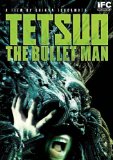| Reviews & Columns |
|
Reviews DVD TV on DVD Blu-ray 4K UHD International DVDs In Theaters Reviews by Studio Video Games Features Collector Series DVDs Easter Egg Database Interviews DVD Talk Radio Feature Articles Columns Anime Talk DVD Savant Horror DVDs The M.O.D. Squad Art House HD Talk Silent DVD
|
DVD Talk Forum |
|
|
| Resources |
|
DVD Price Search Customer Service #'s RCE Info Links |
|
Columns
|
|
|
Tetsuo: The Bullet Man
MPI Home Video // Unrated // June 28, 2011
List Price: $24.98 [Buy now and save at Amazon]
The Film:
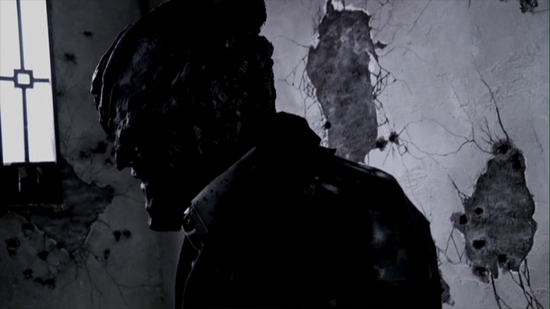
Shinya Tsukamoto's original Tetsuo unleashes hostile metaphorical imagery on its audience by illustrating a man's body being overcome with twisting gears, wires, and pistons, an expression of sexual awakening that's in turns infuriatingly freeform and utterly mesmerizing. Grainy black-and-white photography and a frantic editing style invoke a persistent state of unease, and the disquieting energy it generates isn't something terribly easy to forget. I mention this in greater detail within discussion about Tsukamoto's third Tetsuo film, The Bullet Man, largely because this particular entry stands as a rather different beast, even if the cerebral Japanese director's aesthetic remains palpable. Uncontrollable machinery still thrashes about in faintly analytical fashion, yet its deviation from the qualities of the original -- the look, the momentum, and the purpose -- weigh it down into a scattershot, drab mess.
Much like its predecessors, The Iron Man and Body Hammer, Tsukamoto's latest also powers on the steam of a minimal plot, revolving around the themes of grief and internal turmoil as transformative drivers. This time, the subject falls on the death of a child; a father (Eric Bossick) -- an American working out of Japan, with a Japanese wife -- witnesses his son getting hit by a speeding car, driven by the man (Tsukamoto himself) at the center of the other mechanical abominations from the previous films. He undergoes the same frantic metamorphosis as those before him, slowly morphing into a man made of steel and steam that's virtually indestructible. And with the voice of his wife dominating his ear, calling for revenge on the man that killed their boy, the descent turns into an exploration of their internal demons, alongside delving into the man's personal history with his family and work.
The Bullet Man might broadly mirror its predecessors in concept, but a sizable draw to Tsukamoto's projects lie in the thrashing visual composition. Almost immediately, the film deviates from its pre-established aesthetic; framed wide, shot in crisp high-definition footage instead of grainy black-and-white, and sporting hefty computer-generated imagery within modern shaky-cam style, it veers even further from the virtuoso collage of found objects and raw twisted allure that bolstered the original, more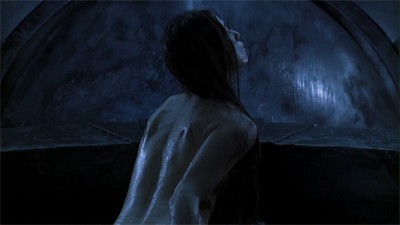 aligned with the composition utilized in Vital than anything else. On the other hand, the editing style and furious movement retains Tsukamoto's haunting stabs at lurid sensory provocation, encapsulated within dense textures and steam as Chi Ishikawa's searing noise-driven music clanks and sputters. Without taking the story into account, The Bullet Man exerts its abrasive force in a fashion not remotely as involving, yet still ascertains industrial, eye-candy-caliber rawness.
aligned with the composition utilized in Vital than anything else. On the other hand, the editing style and furious movement retains Tsukamoto's haunting stabs at lurid sensory provocation, encapsulated within dense textures and steam as Chi Ishikawa's searing noise-driven music clanks and sputters. Without taking the story into account, The Bullet Man exerts its abrasive force in a fashion not remotely as involving, yet still ascertains industrial, eye-candy-caliber rawness.
The reliance on a clearly-defined purpose instead of an interpretive allegory becomes a problem, though, making this a rare occurrence where heightened transparency and cohesiveness diminish an abstract film's quality. Where The Iron Man revels in obfuscated vagueness, as mechanical sex organs and wild, piqued eyes blur into an undefined exploration of awakening and abandon, this continuation of the series fumbles its intellectual firepower by directly centering on revenge and the struggles accompanying the death of one's a child. The idea seems sound, even intriguing and potentially thought-provoking as a meditation on loss and the consuming umbrage that follows; yet it only works as an insubstantial skeleton for Tsukamoto to adorn with his elaborate visual grime, hampered by an inelegant navigation of the English language and a clear satisfaction in dishing out more of the same brash imagery.
Tsukamoto's aptitude as a showman of the abrasive shouldn't be discredited, though, and The Bullet Man still projects a haze of textured corridors and ricocheting bullets that makes it worth watching as an artistic curiosity. He instinctively draws his audience into the encrusted dark makeup work and fuming computer-generated machines, cobbling together a series of gritty expanses -- alongside his shrewd editorial style -- into a furious punk atmosphere that fans of the cult director will find involving. That's largely a byproduct of the fluency built after enduring the director's work, from his previous Tetsuo projects to the likes of the subversive A Snake of June; those accustomed to his aggressive style will find flickers of gratification within witnessing another plunge into psychosomatic mechanical consumption, yet the misspent smarts make it feel like little more than a mere sequel not unlike some commonplace horror franchise.
The DVD:
Video and Audio:
Visual style is key within Shinya Tsukamoto's work, often erring towards deep shadows and a grainy aesthetic. MPI's 1.78:1, 16x9-enhanced transfer clutches onto the onyx sheen against the transforming machine's face and the crackling textures and bullet holes in walls, while the deep contrast projects inky black levels that, while occasionally engulfing detail, likely fit alongside the director's desired effect. The rigid shaky-cam aesthetic moves along gracefully enough, though showing heavy ghosting in a few scenes, while obvious digital grain remains at a fair minimum. It's so hard to tell exactly what Tsukamoto intends with the visuals in his films that it makes critiquing idiosyncrasies like that a bit difficult. Otherwise, though, the sharp lines and dense textures look exceedingly appropriate and rather eye-grabbing in this visual transfer.
Anyone who has at least seen the original Tetsuo knows that the director's films are excruciatingly loud, and boy is The Bullet Man no exception. Extremely harsh sound effects grate, rasp, and pound against the Dolby 5.1 sound design, relenting little throughout the entirety of the picture. Even the slight whispers from the key characters -- which are, remember, predominately in English -- retain a forceful energy, balanced against the subtle hums and buzzing atmosphere in the picture. It does, however, seem like it's dialed up a bit loud, even considering Tsukamoto's aural aims; pulling the dial down nearly ten decibels might be a worthwhile decision. Aside from that, it's a fitting and ferocious sound presentation from MPI. Optional English and Spanish subtitles are available with this release.
Special Features:
Aside from a Trailer (1:59, 16x9), nothing else accompanies this release.
Final Thoughts:
While Shinya Tsukamoto rediscovers the Tetsuo style in The Bullet Man after being away from it for two decades, he isn't able to capture the same degree of entrancement or mental stimulation with this iteration. His fierce audiovisual style still works its brash magic on the eyes and ears, but it's lacking the subversive intensity that it needs to counterbalance its mindfully-shot and -edited stretches of dark, brooding imagery. Tsukamoto's following will want to see what he does with modern tools while inside the world of odd metal bodily contortion and industrial design, but it's one better suited for a Rental.
Thomas Spurlin, Staff Reviewer -- DVDTalk Reviews | Personal Blog/Site

Shinya Tsukamoto's original Tetsuo unleashes hostile metaphorical imagery on its audience by illustrating a man's body being overcome with twisting gears, wires, and pistons, an expression of sexual awakening that's in turns infuriatingly freeform and utterly mesmerizing. Grainy black-and-white photography and a frantic editing style invoke a persistent state of unease, and the disquieting energy it generates isn't something terribly easy to forget. I mention this in greater detail within discussion about Tsukamoto's third Tetsuo film, The Bullet Man, largely because this particular entry stands as a rather different beast, even if the cerebral Japanese director's aesthetic remains palpable. Uncontrollable machinery still thrashes about in faintly analytical fashion, yet its deviation from the qualities of the original -- the look, the momentum, and the purpose -- weigh it down into a scattershot, drab mess.
Much like its predecessors, The Iron Man and Body Hammer, Tsukamoto's latest also powers on the steam of a minimal plot, revolving around the themes of grief and internal turmoil as transformative drivers. This time, the subject falls on the death of a child; a father (Eric Bossick) -- an American working out of Japan, with a Japanese wife -- witnesses his son getting hit by a speeding car, driven by the man (Tsukamoto himself) at the center of the other mechanical abominations from the previous films. He undergoes the same frantic metamorphosis as those before him, slowly morphing into a man made of steel and steam that's virtually indestructible. And with the voice of his wife dominating his ear, calling for revenge on the man that killed their boy, the descent turns into an exploration of their internal demons, alongside delving into the man's personal history with his family and work.
The Bullet Man might broadly mirror its predecessors in concept, but a sizable draw to Tsukamoto's projects lie in the thrashing visual composition. Almost immediately, the film deviates from its pre-established aesthetic; framed wide, shot in crisp high-definition footage instead of grainy black-and-white, and sporting hefty computer-generated imagery within modern shaky-cam style, it veers even further from the virtuoso collage of found objects and raw twisted allure that bolstered the original, more
 aligned with the composition utilized in Vital than anything else. On the other hand, the editing style and furious movement retains Tsukamoto's haunting stabs at lurid sensory provocation, encapsulated within dense textures and steam as Chi Ishikawa's searing noise-driven music clanks and sputters. Without taking the story into account, The Bullet Man exerts its abrasive force in a fashion not remotely as involving, yet still ascertains industrial, eye-candy-caliber rawness.
aligned with the composition utilized in Vital than anything else. On the other hand, the editing style and furious movement retains Tsukamoto's haunting stabs at lurid sensory provocation, encapsulated within dense textures and steam as Chi Ishikawa's searing noise-driven music clanks and sputters. Without taking the story into account, The Bullet Man exerts its abrasive force in a fashion not remotely as involving, yet still ascertains industrial, eye-candy-caliber rawness. The reliance on a clearly-defined purpose instead of an interpretive allegory becomes a problem, though, making this a rare occurrence where heightened transparency and cohesiveness diminish an abstract film's quality. Where The Iron Man revels in obfuscated vagueness, as mechanical sex organs and wild, piqued eyes blur into an undefined exploration of awakening and abandon, this continuation of the series fumbles its intellectual firepower by directly centering on revenge and the struggles accompanying the death of one's a child. The idea seems sound, even intriguing and potentially thought-provoking as a meditation on loss and the consuming umbrage that follows; yet it only works as an insubstantial skeleton for Tsukamoto to adorn with his elaborate visual grime, hampered by an inelegant navigation of the English language and a clear satisfaction in dishing out more of the same brash imagery.
Tsukamoto's aptitude as a showman of the abrasive shouldn't be discredited, though, and The Bullet Man still projects a haze of textured corridors and ricocheting bullets that makes it worth watching as an artistic curiosity. He instinctively draws his audience into the encrusted dark makeup work and fuming computer-generated machines, cobbling together a series of gritty expanses -- alongside his shrewd editorial style -- into a furious punk atmosphere that fans of the cult director will find involving. That's largely a byproduct of the fluency built after enduring the director's work, from his previous Tetsuo projects to the likes of the subversive A Snake of June; those accustomed to his aggressive style will find flickers of gratification within witnessing another plunge into psychosomatic mechanical consumption, yet the misspent smarts make it feel like little more than a mere sequel not unlike some commonplace horror franchise.
The DVD:
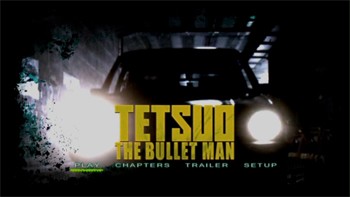 | 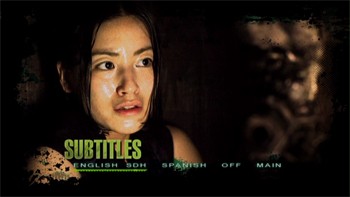 |
Video and Audio:
Visual style is key within Shinya Tsukamoto's work, often erring towards deep shadows and a grainy aesthetic. MPI's 1.78:1, 16x9-enhanced transfer clutches onto the onyx sheen against the transforming machine's face and the crackling textures and bullet holes in walls, while the deep contrast projects inky black levels that, while occasionally engulfing detail, likely fit alongside the director's desired effect. The rigid shaky-cam aesthetic moves along gracefully enough, though showing heavy ghosting in a few scenes, while obvious digital grain remains at a fair minimum. It's so hard to tell exactly what Tsukamoto intends with the visuals in his films that it makes critiquing idiosyncrasies like that a bit difficult. Otherwise, though, the sharp lines and dense textures look exceedingly appropriate and rather eye-grabbing in this visual transfer.
Anyone who has at least seen the original Tetsuo knows that the director's films are excruciatingly loud, and boy is The Bullet Man no exception. Extremely harsh sound effects grate, rasp, and pound against the Dolby 5.1 sound design, relenting little throughout the entirety of the picture. Even the slight whispers from the key characters -- which are, remember, predominately in English -- retain a forceful energy, balanced against the subtle hums and buzzing atmosphere in the picture. It does, however, seem like it's dialed up a bit loud, even considering Tsukamoto's aural aims; pulling the dial down nearly ten decibels might be a worthwhile decision. Aside from that, it's a fitting and ferocious sound presentation from MPI. Optional English and Spanish subtitles are available with this release.
Special Features:
Aside from a Trailer (1:59, 16x9), nothing else accompanies this release.
Final Thoughts:
While Shinya Tsukamoto rediscovers the Tetsuo style in The Bullet Man after being away from it for two decades, he isn't able to capture the same degree of entrancement or mental stimulation with this iteration. His fierce audiovisual style still works its brash magic on the eyes and ears, but it's lacking the subversive intensity that it needs to counterbalance its mindfully-shot and -edited stretches of dark, brooding imagery. Tsukamoto's following will want to see what he does with modern tools while inside the world of odd metal bodily contortion and industrial design, but it's one better suited for a Rental.
|
| Popular Reviews |
| Sponsored Links |
|
|
| Sponsored Links |
|
|
| Release List | Reviews | Shop | Newsletter | Forum | DVD Giveaways | Blu-Ray | Advertise |
|
Copyright 2024 DVDTalk.com All Rights Reserved. Legal Info, Privacy Policy, Terms of Use,
Manage Preferences,
Your Privacy Choices | |||||||









